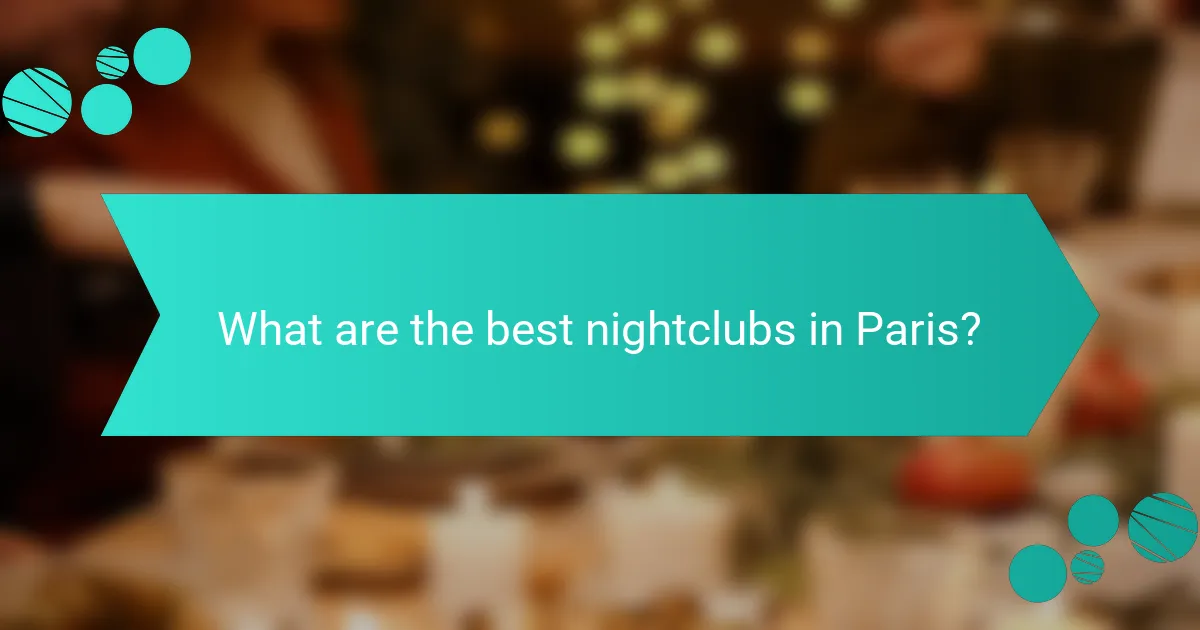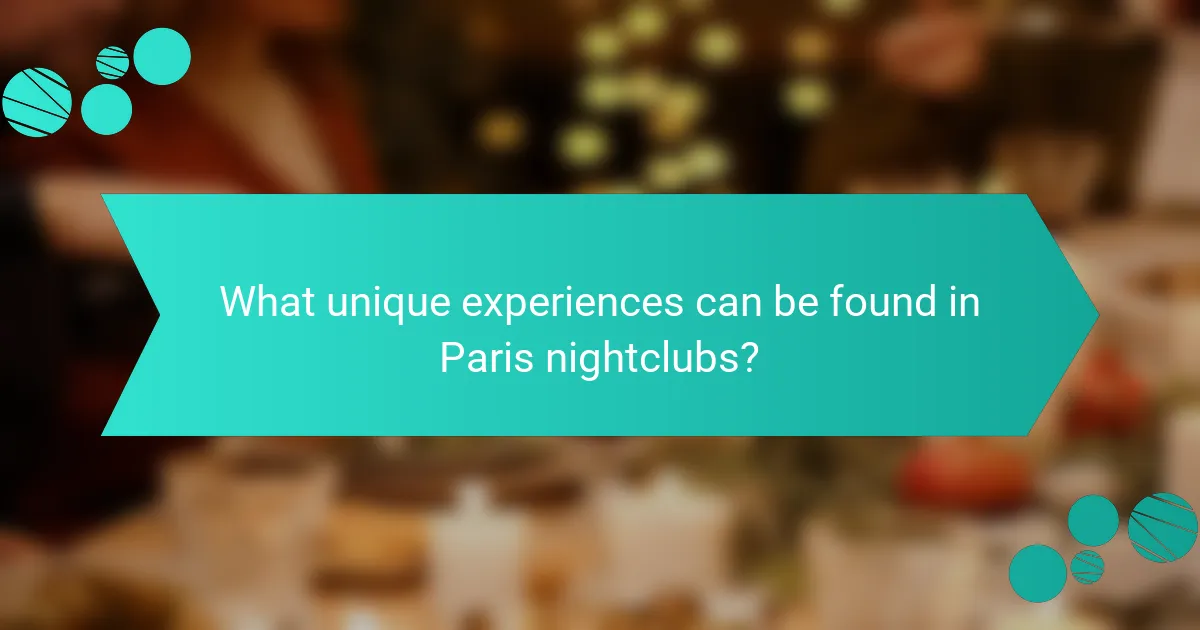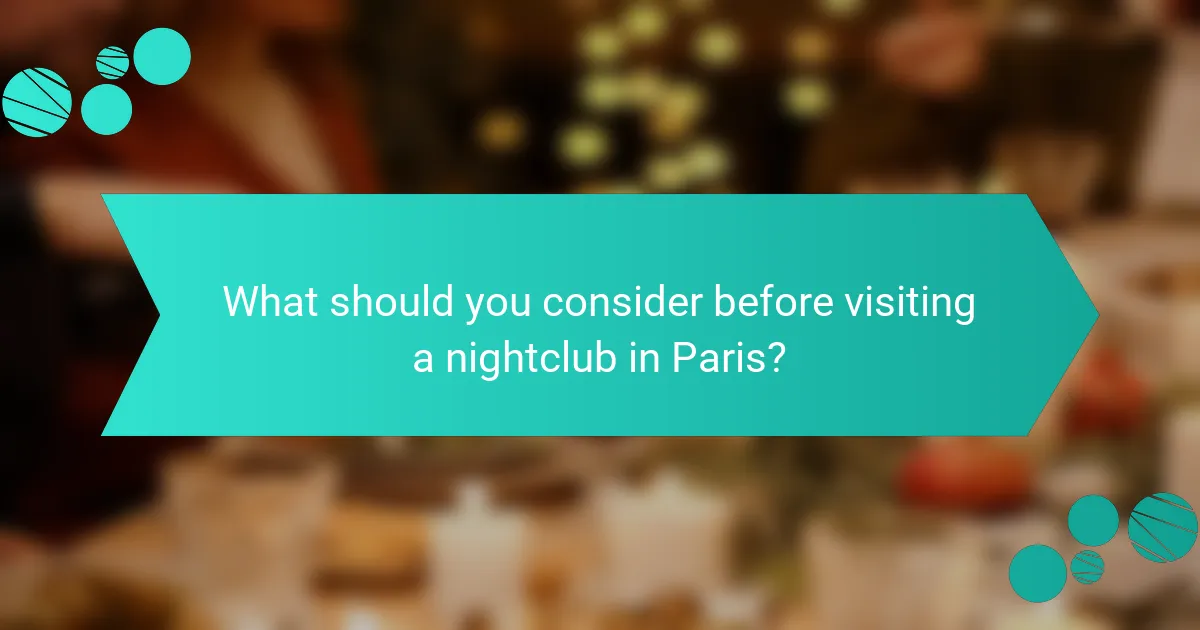The article focuses on the best nightclubs in Paris, highlighting key venues such as Rex Club, Concrete, and Le Bataclan. Rex Club is celebrated for its electronic music scene and vibrant atmosphere, while Concrete is known for its riverside location and diverse music lineup. Le Bataclan serves as both a nightclub and a concert venue, offering historical significance and a unique ambiance. The nightlife in Paris is characterized by immersive experiences, themed parties, and renowned DJ performances, with clubs emphasizing specific music genres and providing exclusive VIP areas. The article also outlines essential considerations for visitors, including atmosphere, dress code, entry fees, and safety.

What are the best nightclubs in Paris?
The best nightclubs in Paris include Rex Club, Concrete, and Le Bataclan. Rex Club is renowned for its electronic music scene. It has hosted prominent DJs and offers a vibrant atmosphere. Concrete is famous for its riverside location and extended opening hours. It features a diverse lineup of music genres. Le Bataclan is not only a nightclub but also a concert venue. It has historical significance and a unique ambiance. These venues consistently attract locals and tourists alike. They are recognized for their quality sound systems and immersive experiences.
How do Parisian nightclubs differ from those in other cities?
Parisian nightclubs are distinct due to their unique blend of culture, ambiance, and music styles. They often emphasize artistic themes and historical venues, creating a more immersive experience. Many nightclubs in Paris feature eclectic music genres, from house to techno, reflecting the city’s diverse cultural influences. The atmosphere in Parisian clubs is often more intimate and sophisticated compared to those in other cities. Additionally, many clubs have a strict door policy, prioritizing a curated crowd. This exclusivity enhances the overall experience and allure of nightlife in Paris. The city’s nightlife also often intertwines with art and fashion, making it a cultural hub.
What cultural influences shape the nightclub scene in Paris?
The nightclub scene in Paris is shaped by various cultural influences, including music, fashion, and art. The city’s rich history of artistic movements, such as Surrealism and Impressionism, contributes to its vibrant nightlife. Paris has been a hub for diverse music genres, from electronic to jazz, influencing club programming. Additionally, the fashion industry in Paris sets trends that impact nightclub aesthetics and dress codes. The multicultural population of Paris introduces global music and dance styles, enriching the nightlife experience. Events like Paris Fashion Week and the Nuit Blanche festival further integrate art and performance into the club scene. Historical venues, such as Le Bataclan and Rex Club, reflect the city’s cultural legacy in nightlife. Overall, these elements create a dynamic environment that defines Paris’s unique nightclub culture.
How does the history of nightlife in Paris impact current venues?
The history of nightlife in Paris significantly influences current venues. Historical movements, such as the Jazz Age and the Bohemian culture, shaped the city’s nightlife identity. The emergence of iconic venues like Le Caveau de la Huchette established a legacy of live music. Modern clubs often pay homage to this heritage through decor and programming. Additionally, the evolution of nightlife laws affects venue operations and styles. Current venues blend traditional Parisian aesthetics with contemporary trends. This fusion creates unique experiences that attract both locals and tourists. The historical significance of neighborhoods like Montmartre continues to impact venue locations and themes. Overall, the rich history of Parisian nightlife remains a cornerstone for today’s vibrant scene.
What factors contribute to the atmosphere of Parisian nightclubs?
The atmosphere of Parisian nightclubs is influenced by several key factors. Lighting plays a crucial role, creating an ambiance that enhances the overall experience. The design of the venue contributes significantly, with many clubs featuring unique architectural elements. Music genre selection is vital, as it shapes the mood and energy of the crowd. The presence of skilled DJs and live performers adds to the dynamic atmosphere. Additionally, the diversity of patrons fosters an inclusive environment. Drinks and cocktail offerings enhance the social experience, while themed events can create memorable nights. Collectively, these elements establish the distinctive vibe of Parisian nightlife.
How does lighting play a role in creating nightclub ambiance?
Lighting is crucial in creating nightclub ambiance. It sets the mood and influences patrons’ emotions. Different lighting styles evoke various feelings. For instance, dim lighting can create intimacy, while bright colors can energize the space. Dynamic lighting, such as strobe lights and LED displays, enhances the music experience. Studies show that lighting affects how people perceive their surroundings. In nightclubs, it can encourage social interaction and dance. Effective lighting design is essential for a memorable nightlife experience.
What elements of design are commonly found in popular nightclubs?
Popular nightclubs typically feature elements such as vibrant lighting, open layouts, and unique decor. Vibrant lighting includes LED fixtures and laser shows to create an energetic atmosphere. Open layouts allow for easy movement and social interaction among guests. Unique decor often reflects the club’s theme or brand identity, enhancing the overall experience. Additionally, sound systems are designed for high-quality audio, crucial for music enjoyment. Bars are strategically placed for accessibility, offering a variety of drinks. Comfortable seating areas provide relaxation options, while dance floors encourage engagement. These design elements contribute to a dynamic nightlife experience.
What music genres are prevalent in Paris nightclubs?
Electronic dance music (EDM) is prevalent in Paris nightclubs. House, techno, and trance are popular subgenres. Hip-hop also has a significant presence in these venues. Additionally, disco and funk can be heard in various clubs. Many nightclubs feature live performances from local and international DJs. The vibrant nightlife scene in Paris attracts diverse music tastes. According to a 2022 survey, 70% of club-goers prefer electronic genres. This trend reflects the city’s dynamic music culture.
How do different genres influence the overall nightclub experience?
Different genres significantly influence the overall nightclub experience by shaping the atmosphere, crowd behavior, and energy levels. Electronic dance music (EDM) creates a high-energy environment, often featuring elaborate light shows. Hip-hop encourages social interaction and often attracts a diverse crowd. House music promotes a laid-back vibe, allowing for extended dancing sessions. Rock and alternative genres can evoke nostalgia, leading to more emotional connections among attendees. Each genre also dictates the DJ’s style and performance, affecting audience engagement. Research indicates that music genres can alter mood and social dynamics, enhancing the overall experience in nightclubs.
Which genres are most popular among club-goers in Paris?
Electronic dance music (EDM) is the most popular genre among club-goers in Paris. This genre includes sub-genres like house, techno, and trance. House music, known for its repetitive beats, attracts many dancers. Techno, with its faster tempo and synthesized sounds, is also widely favored. Trance music, characterized by its melodic phrases, creates a euphoric atmosphere. Hip-hop is another popular genre, appealing to a diverse audience. It features rhythmic vocal delivery and beats that resonate with many club-goers. Lastly, pop music remains a staple in clubs, often played to engage a broader crowd. These genres reflect the vibrant nightlife culture of Paris, attracting both locals and tourists.

What unique experiences can be found in Paris nightclubs?
Paris nightclubs offer unique experiences such as immersive themed parties and renowned DJ performances. Many clubs feature elaborate decor that transforms the space into a different world. Some venues host live art performances, blending nightlife with creative expression. Others provide exclusive VIP areas with personalized service for a premium experience. Certain nightclubs emphasize specific music genres, creating a niche atmosphere for enthusiasts. Additionally, some clubs are known for their historic significance, adding a cultural layer to the nightlife experience. Paris nightclubs often host international talent, ensuring a diverse musical lineup. This combination of elements makes the nightlife in Paris distinct and memorable.
What themed nights or events are common in Parisian nightclubs?
Common themed nights in Parisian nightclubs include 80s and 90s retro nights. These events celebrate nostalgia with music and fashion from those decades. Another popular theme is [censured] nights, fostering inclusivity and vibrant performances. Additionally, many clubs host international music nights, showcasing genres like Latin, Afrobeat, and electronic. Costume parties are also frequent, encouraging creative outfits and themes. Some clubs offer live music events featuring local bands or DJs. Special holiday-themed nights occur during events like Halloween and New Year’s Eve. These themes enhance the nightlife experience in Paris, attracting diverse crowds.
How do special events enhance the nightclub experience?
Special events enhance the nightclub experience by creating unique atmospheres and drawing larger crowds. These events often feature renowned DJs or live performers, elevating the entertainment value. Themed nights or special occasions, such as holidays, attract diverse audiences seeking memorable experiences. Exclusive promotions, such as drink specials or VIP packages, incentivize attendance. According to a study by the Night Time Industries Association, special events can increase foot traffic by up to 30%. Additionally, they foster a sense of community among attendees, encouraging social interactions and networking. Overall, special events significantly contribute to the vibrancy and appeal of nightclubs.
What are some notable one-off events that have occurred in Paris nightclubs?
Some notable one-off events that have occurred in Paris nightclubs include the 2017 Daft Punk tribute at Le Trianon. This event celebrated the iconic French duo’s music and attracted a large crowd. Another significant event was the 2019 “La Nuit de la Mode” at Le Baron, showcasing top fashion designers. In 2020, the “New Year’s Eve Masquerade Ball” at the Rex Club was a highlight, featuring renowned DJs. Each of these events drew attention for their unique themes and high-profile attendees.
How do Paris nightclubs incorporate art and performance?
Paris nightclubs incorporate art and performance through immersive experiences and visual elements. Many venues feature live art installations that engage patrons. Performance artists often take the stage, blending music with dance and theatrical displays. Clubs like Le Bataclan and La Machine du Moulin Rouge showcase local talent and avant-garde performances. This integration creates a dynamic atmosphere that enhances the nightlife experience. Additionally, themed events often highlight specific artistic movements or cultural influences. The fusion of art and nightlife in Paris reflects the city’s rich cultural heritage and creative spirit.
What types of performances can be expected in these venues?
Nightclubs in Paris typically host DJ performances, live music acts, and dance shows. DJs spin various genres, including house, techno, and hip-hop. Live music can feature local bands or international artists. Dance shows may include professional dancers or themed performances. These venues often emphasize immersive experiences with visuals and lighting. Many nightclubs also cater to specific themes or events, enhancing the overall atmosphere. Popular venues like Rex Club and Le Bataclan are known for their diverse lineups. This variety attracts a wide audience, contributing to the vibrant nightlife scene in Paris.
How does the integration of art elevate the nightlife experience?
The integration of art elevates the nightlife experience by enhancing ambiance and engagement. Art installations create immersive environments that captivate patrons. These visual elements stimulate creativity and inspire social interactions. Nightclubs featuring art often attract diverse crowds, fostering a sense of community. For instance, venues like Le Trianon in Paris showcase artistic performances alongside music. This combination enriches the overall sensory experience. Statistics show that clubs with artistic themes report higher customer satisfaction. Engaging with art also encourages longer visits, increasing overall revenue for venues.

What should you consider before visiting a nightclub in Paris?
Before visiting a nightclub in Paris, consider the venue’s atmosphere and music genre. Different nightclubs cater to various tastes and experiences. Research the club’s reputation and reviews online. Check the dress code, as many clubs in Paris enforce specific attire. Look into the entry fees and any guest list requirements. Be aware of the club’s operating hours, as they can vary significantly. Lastly, consider the location and safety of the surrounding area when planning your visit.
What are the dress codes and etiquette for Paris nightclubs?
Paris nightclubs typically require stylish and upscale attire. Men often wear tailored suits or dress shirts with smart shoes. Women usually opt for elegant dresses or chic outfits paired with high heels. Casual wear, such as sneakers and shorts, is generally not acceptable.
Etiquette in Paris nightclubs includes arriving on time and respecting the venue’s policies. Guests should avoid excessive noise and maintain a polite demeanor. It is common to wait in line for entry, especially at popular venues. Tipping bartenders is appreciated, usually around 10% of the bill.
These dress codes and etiquette guidelines help maintain the sophisticated atmosphere of Paris nightlife.
How can dressing appropriately enhance your nightclub experience?
Dressing appropriately enhances your nightclub experience by aligning with the venue’s atmosphere. Nightclubs often have specific dress codes that reflect their style and clientele. Adhering to these dress codes can lead to smoother entry and a more enjoyable night. For instance, upscale venues may require formal attire, while casual clubs might allow relaxed styles. Dressing well can also boost your confidence and social interactions. A study by the Journal of Experimental Social Psychology found that individuals dressed in formal attire feel more powerful and engaged. This heightened confidence can improve your overall experience and interactions with others.
What are common rules or customs to be aware of?
Common rules or customs in Paris nightclubs include dress codes, age restrictions, and entry fees. Many clubs require patrons to dress smartly, avoiding casual attire like sneakers or shorts. Age restrictions typically mandate that guests be at least 18 years old. Entry fees can vary, with some clubs charging cover fees while others may offer free admission before a certain time. It’s customary to arrive early to avoid long lines. Additionally, respect for personal space and noise levels is important in social settings. Familiarity with local customs enhances the overall experience in Parisian nightlife.
What tips can help ensure a great night out in Paris nightclubs?
To ensure a great night out in Paris nightclubs, plan ahead and choose the right venue. Research club atmospheres and music genres to find one that suits your taste. Arrive early to avoid long lines and secure a good spot. Dress appropriately, as many clubs have a dress code. Consider making a reservation for tables or VIP areas to enhance your experience. Stay hydrated and be mindful of your alcohol consumption to enjoy the night. Utilize public transportation or arrange for a safe ride home to ensure your safety. Engaging with locals can provide insider tips on the best spots and events happening that night.
How can you choose the right nightclub based on your preferences?
To choose the right nightclub based on your preferences, identify your desired atmosphere and music genre. Consider whether you prefer an upscale venue or a casual setting. Research nightclubs that match your vibe, such as those known for electronic music or live bands. Look for reviews and ratings to gauge the experiences of others. Check the club’s schedule for special events or themed nights that align with your interests. Visit social media pages to see photos and videos of the environment. Also, consider the location and accessibility of the nightclub. Ensure it fits your logistical needs, such as transportation options and safety.
What are the best times to visit nightclubs in Paris for a lively atmosphere?
The best times to visit nightclubs in Paris for a lively atmosphere are typically from midnight to 3 AM on weekends. During this timeframe, clubs reach peak attendance and energy levels. Friday and Saturday nights are particularly vibrant, attracting locals and tourists alike. Many clubs host special events or themed nights, enhancing the experience. Arriving after midnight allows guests to enjoy a bustling environment with a full dance floor. Additionally, some venues may have live DJs or performances that start around this time, further contributing to the lively atmosphere.
The main entity of the article is the best nightclubs in Paris, focusing on their atmosphere, music genres, and unique experiences. Key nightclubs highlighted include Rex Club, Concrete, and Le Bataclan, each known for their distinct offerings and vibrant environments. The article explores how Parisian nightclubs differ from those in other cities, influenced by cultural elements such as music, fashion, and art. Additionally, it discusses factors contributing to the ambiance, popular music genres, themed events, and essential tips for visitors to enhance their nightlife experience in Paris.